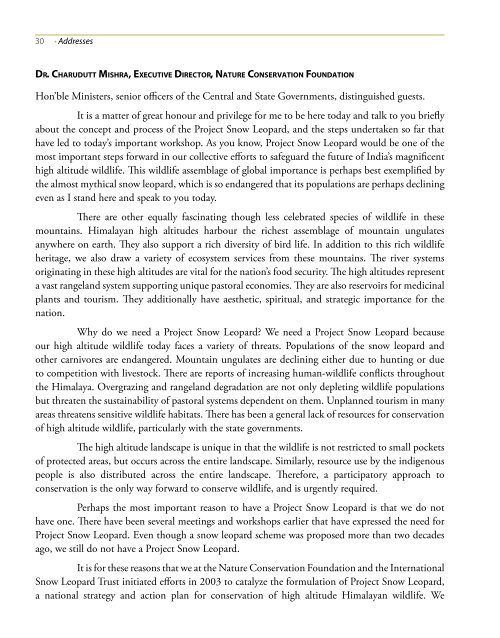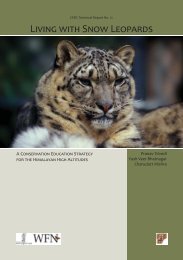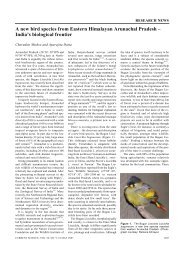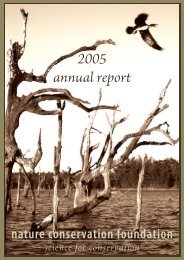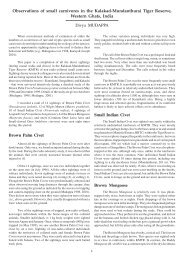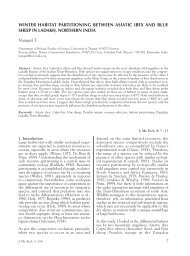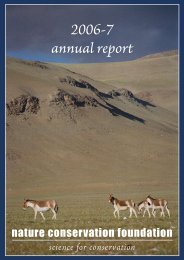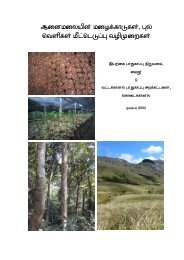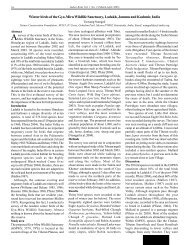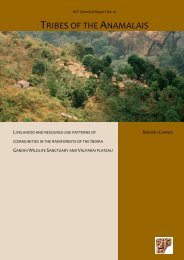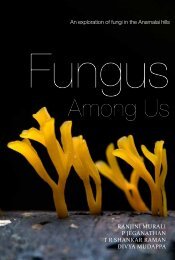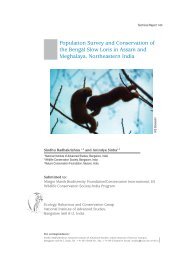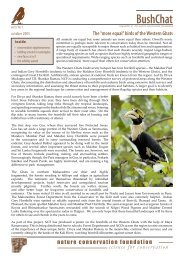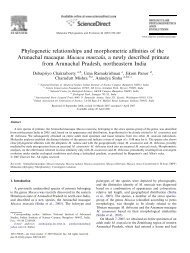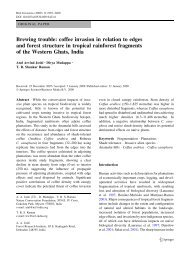towards project snow leopard - Nature Conservation Foundation
towards project snow leopard - Nature Conservation Foundation
towards project snow leopard - Nature Conservation Foundation
You also want an ePaper? Increase the reach of your titles
YUMPU automatically turns print PDFs into web optimized ePapers that Google loves.
30 • Addresses<br />
Dr. Charudutt Mishra, Executive Director, <strong>Nature</strong> <strong>Conservation</strong> <strong>Foundation</strong><br />
Hon’ble Ministers, senior officers of the Central and State Governments, distinguished guests.<br />
It is a matter of great honour and privilege for me to be here today and talk to you briefly<br />
about the concept and process of the Project Snow Leopard, and the steps undertaken so far that<br />
have led to today’s important workshop. As you know, Project Snow Leopard would be one of the<br />
most important steps forward in our collective efforts to safeguard the future of India’s magnificent<br />
high altitude wildlife. This wildlife assemblage of global importance is perhaps best exemplified by<br />
the almost mythical <strong>snow</strong> <strong>leopard</strong>, which is so endangered that its populations are perhaps declining<br />
even as I stand here and speak to you today.<br />
There are other equally fascinating though less celebrated species of wildlife in these<br />
mountains. Himalayan high altitudes harbour the richest assemblage of mountain ungulates<br />
anywhere on earth. They also support a rich diversity of bird life. In addition to this rich wildlife<br />
heritage, we also draw a variety of ecosystem services from these mountains. The river systems<br />
originating in these high altitudes are vital for the nation’s food security. The high altitudes represent<br />
a vast rangeland system supporting unique pastoral economies. They are also reservoirs for medicinal<br />
plants and tourism. They additionally have aesthetic, spiritual, and strategic importance for the<br />
nation.<br />
Why do we need a Project Snow Leopard? We need a Project Snow Leopard because<br />
our high altitude wildlife today faces a variety of threats. Populations of the <strong>snow</strong> <strong>leopard</strong> and<br />
other carnivores are endangered. Mountain ungulates are declining either due to hunting or due<br />
to competition with livestock. There are reports of increasing human-wildlife conflicts throughout<br />
the Himalaya. Overgrazing and rangeland degradation are not only depleting wildlife populations<br />
but threaten the sustainability of pastoral systems dependent on them. Unplanned tourism in many<br />
areas threatens sensitive wildlife habitats. There has been a general lack of resources for conservation<br />
of high altitude wildlife, particularly with the state governments.<br />
The high altitude landscape is unique in that the wildlife is not restricted to small pockets<br />
of protected areas, but occurs across the entire landscape. Similarly, resource use by the indigenous<br />
people is also distributed across the entire landscape. Therefore, a participatory approach to<br />
conservation is the only way forward to conserve wildlife, and is urgently required.<br />
Perhaps the most important reason to have a Project Snow Leopard is that we do not<br />
have one. There have been several meetings and workshops earlier that have expressed the need for<br />
Project Snow Leopard. Even though a <strong>snow</strong> <strong>leopard</strong> scheme was proposed more than two decades<br />
ago, we still do not have a Project Snow Leopard.<br />
It is for these reasons that we at the <strong>Nature</strong> <strong>Conservation</strong> <strong>Foundation</strong> and the International<br />
Snow Leopard Trust initiated efforts in 2003 to catalyze the formulation of Project Snow Leopard,<br />
a national strategy and action plan for conservation of high altitude Himalayan wildlife. We


